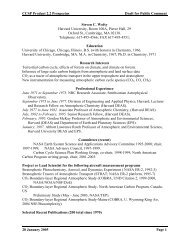Decision support experiments and evaluations using seasonal to ...
Decision support experiments and evaluations using seasonal to ...
Decision support experiments and evaluations using seasonal to ...
You also want an ePaper? Increase the reach of your titles
YUMPU automatically turns print PDFs into web optimized ePapers that Google loves.
The U.S. Climate Change Science Program<br />
Science citizenship<br />
clearly has a crucial<br />
role <strong>to</strong> play in<br />
building bridges<br />
between science<br />
<strong>and</strong> societal values<br />
in water resource<br />
management.<br />
146<br />
from scientists <strong>to</strong> citizens, multi-directional<br />
processes involving coproduction of science<br />
<strong>and</strong> policy may take a more circui<strong>to</strong>us form,<br />
one that requires experimentation <strong>and</strong> iteration<br />
(Lemos <strong>and</strong> Morehouse, 2005; Jasanoff <strong>and</strong><br />
Wynne, 1998). This model of science-society<br />
interaction has a close affinity <strong>to</strong> concepts of<br />
adaptive management <strong>and</strong> adaptive governance<br />
(Pulwarty <strong>and</strong> Melis, 2001; Gunderson, 1999;<br />
Holling, 1978; Brunner et al., 2005), for both<br />
of these concepts are founded on notions that<br />
institutional <strong>and</strong> organizational learning can<br />
be facilitated through careful experimentation<br />
with different decision <strong>and</strong> policy options. Such<br />
experimentation is ideally based on best available<br />
knowledge but allows for changes based on<br />
lessons learned, emergence of new knowledge,<br />
<strong>and</strong>/or changing conditions in the physical or<br />
social realms. The <strong>experiments</strong> described in this<br />
Product offer examples of adaptive management<br />
<strong>and</strong> adaptive governance in practice.<br />
Less extensively documented, but no less essential<br />
<strong>to</strong> bringing science <strong>to</strong> bear effectively<br />
on climate-related water resource management<br />
challenges is the notion of science citizenship<br />
(Jasanoff, 2004b), whereby the fruits of collaboration<br />
between scientists <strong>and</strong> citizens produces<br />
capacity <strong>to</strong> bring science-informed knowledge<br />
in<strong>to</strong> processes of democratic deliberation,<br />
including network building, participation in<br />
policy-making, influencing policy interpretation<br />
<strong>and</strong> implementation processes, <strong>and</strong> even<br />
voting in elections. Science citizenship might,<br />
for example, involve participating in deliberations<br />
about how best <strong>to</strong> avert or mitigate the<br />
impacts of climate variability <strong>and</strong> change on<br />
populations, economic sec<strong>to</strong>rs, <strong>and</strong> natural<br />
systems vulnerable <strong>to</strong> reduced access <strong>to</strong> water.<br />
Indeed, water is fundamental <strong>to</strong> life <strong>and</strong> livelihood,<br />
<strong>and</strong>, as noted above, climate impacts<br />
research has revealed that deleterious effects<br />
of water shortages are unequally experienced;<br />
poorer <strong>and</strong> more marginalized segments of populations<br />
often suffer the most (Lemos, 2008).<br />
Innovative drought planning processes require<br />
precisely these kinds of input, as does planning<br />
for long-term reductions in water availability<br />
due <strong>to</strong> reduced snowpack. Issues such as these<br />
require substantial evaluation of how alternative<br />
solutions are likely <strong>to</strong> affect different entities<br />
at different times <strong>and</strong> in different places. For<br />
example, substantial reduction in snowpack,<br />
<strong>to</strong>gether with earlier snowmelt <strong>and</strong> longer periods<br />
before the onset of the following winter,<br />
will likely require serious examination of social<br />
values <strong>and</strong> practices as well as of economic activities<br />
throughout a given watershed <strong>and</strong> water<br />
delivery area. As these examples demonstrate,<br />
science citizenship clearly has a crucial role<br />
<strong>to</strong> play in building bridges between science<br />
<strong>and</strong> societal values in water resource management.<br />
It is likely that this will occur primarily<br />
through the types of knowledge networks <strong>and</strong><br />
knowledge-<strong>to</strong>-action networks discussed earlier<br />
in this Chapter.<br />
5.2.5 Trends <strong>and</strong> Reforms in Water<br />
Resources Provide New Perspectives<br />
As noted in Chapters 1 <strong>and</strong> 4, since the 1980s<br />
a “new paradigm” or frame for federal water<br />
planning has developed that appears <strong>to</strong> reflect<br />
the ascendancy of an environmental protection<br />
ethic among the general public. The new paradigm<br />
emphasizes greater stakeholder participation<br />
in decision making; explicit commitment <strong>to</strong><br />
environmentally-sound, socially-just outcomes;<br />
greater reliance upon drainage basins as planning<br />
units; program management via spatial <strong>and</strong><br />
managerial flexibility, collaboration, participation,<br />
<strong>and</strong> sound, peer-reviewed science; <strong>and</strong> an<br />
embrace of ecological, economic, <strong>and</strong> equity<br />
considerations (Hartig et al., 1992; L<strong>and</strong>re <strong>and</strong><br />
Knuth, 1993; Cortner <strong>and</strong> Moote, 1994; Water<br />
in the West, 1998; McGinnis, 1995; Miller et.<br />
al., 1996; Cody, 1999; Bormann et al., 1994;<br />
Lee, 1993).<br />
This “adaptive management” paradigm results<br />
in a number of climate-related SI climate information<br />
needs, including questions pertaining<br />
<strong>to</strong> the following: what are the decision-<strong>support</strong><br />
needs related <strong>to</strong> managing in-stream flows/<br />
low flows? <strong>and</strong>, what changes <strong>to</strong> water quality,<br />
runoff <strong>and</strong> streamflow will occur in the<br />
future, <strong>and</strong> how will these changes affect<br />
water uses among future generations unable <strong>to</strong><br />
influence the current causes of these changes?<br />
The most dramatic change in decision <strong>support</strong><br />
that emerges from the adaptive management<br />
paradigm is the need for real-time moni<strong>to</strong>ring<br />
<strong>and</strong> ongoing assessment of the effectiveness of<br />
management practices, <strong>and</strong> the possibility that<br />
outcomes recommended by decision-<strong>support</strong><br />
<strong>to</strong>ols be iterative, incremental <strong>and</strong> reversible if<br />
they prove unresponsive <strong>to</strong> critical groups, in-<br />
Chapter 5




